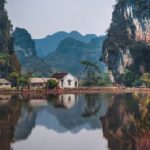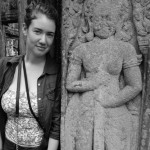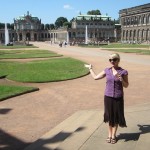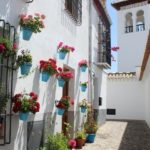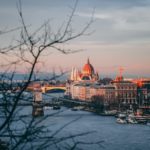Exploring the War in Vietnam: A Lesson in Perspective
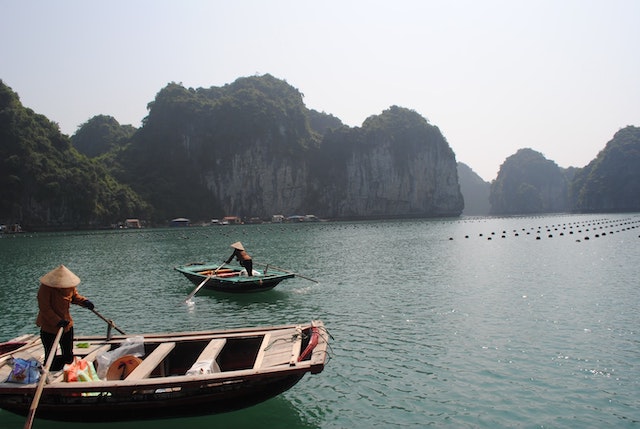
It is hard to believe that I have to renew my passport already! At least I get to take a new photo. I barely recognize 20-year-old me, pale, bloated, and hung over smiling for a CVS employee early on a Saturday morning in Lewisburg, PA where I went to college.
My mom had misplaced my passport and I was about to embark on a trip around the world in just a few weeks for a three-month study abroad program with Semester at Sea. “You need to get out of bed and go get your photo taken ASAP!” That bright yellow t-shirt was a poor choice.
I felt vulnerable, exposed, a perpetrator in enemy territory. Look what that white man had done to someone’s father, brother, or son.
I love flipping through the worn pages now filled with visas and stamps from Brazil, South Africa, India, Vietnam, Japan, and Peru, to name a few. Each country represents a moment of wonder and learning that collectively have transformed that naïve and privileged girl in the photo. My passport feels like a life membership punch card or a traveler’s Brownie sash. It holds evidence of time spent collecting character and virtue.
For me, the Vietnam stamp is my “perspective” badge. I grew up white, safe, and with every opportunity to learn and achieve. I loved science for its concreteness and possibilities, and I dismissed history for its endless dates and irrelevant finiteness.
The emotional anticipation of stepping foot in Vietnam was palpable among my peers and professors. A few gentlemen were returning to the harsh landscape for the first time since they served as young American soldiers. Honestly, the gravity of the situation was lost on me. I could neither recall the dates during which the war in Vietnam was fought nor could I intelligibly explain its purpose. All I knew was that the Vietnam War divided our nation and continues to haunt our veterans and their families today.
I vividly remember the day I stood alone somewhere in Ho Chi Minh City inside The War Remnants Museum gazing at a black and white photograph of a GI holding up a mangled Vietnamese corpse. To my left stood a group of Vietnamese school children on a field trip, some staring at the same photo and some peering at me. I felt vulnerable, exposed, a perpetrator in enemy territory. Look what that white man had done to someone’s father, brother, or son. I could not hide behind the American-written textbooks or the thousands of miles of ocean that separated me from these people. That moment pierced my tiny bubble forever.
I knew I had nothing to be ashamed of, though. That was not a photo of me committing a violent act. The museum used to be called “Exhibition House for US and Puppet Crimes.” Its purpose: “to systematically study, collect, preserve and display exhibits on war crimes and aftermaths foreign aggressive forces caused for Vietnamese people.” Very different from the variety of unbiased museums I had experienced prior, this museum boasted anti-American propaganda from start to finish. I was shaken but not defensive. Instead, I experienced a surprising awareness of my own humanity. I was bound to those children, not in guilt, but in the same sadness, anger, and fear that result from our realization of the brutality that we are capable of inflicting on each other.
About 70km northwest of downtown, I also explored Cu Chi Tunnel, a preserved portion of the underground labyrinth that the Viet Cong built by hand and used to undermine and combat American military. The entire attraction is quite touristy complete with a rifle range and a gift shop, but with a little focus and imagination, the experience is powerful.
Building the elaborate tunnels by hand required ingenuity, commitment, and sacrifice from hundreds of thousands of soldiers. Living underground in hot, humid, rodent and disease-infested darkness must have been grueling torture, a trying preview to the real torture of war waiting above ground. I crawled through those tunnels, choking back tears as sweat dripped down my back and a bat fluttered around my head. I smiled for the camera, because that is what you do, but looking in my eyes I can still feel my trepidation. Safety is truly a luxury that I had taken for granted.
I was bound to those children, not in guilt, but in the same sadness, anger, and fear that result from our realization of the brutality that we are capable of inflicting on each other.
Prior to disembarking the ship, our lecturers sternly reminded us, “Vietnam is a country, not just a war.” Vietnam is indeed a beautiful country with colorful landscapes and people. You could visit Vietnam and enjoy a peaceful float on the Mekong Delta and delight in eating the freshest pineapple you have ever tasted. You can buy gorgeous orchids from a gracious woman on the side of the road and you can feast your eyes on a glowing sunrise over endless paddy fields. You would be remiss, however, to travel to Vietnam and forget it was also a war.
Recalling my time in Vietnam stirs up deep feelings of aliveness. Experiencing how the “other side” remembers its darkest times broadened my perspective of the world. For the first time, I was forced to assess my place in it. I had been going along with the identity of “us” versus “them,” but standing among “them,” I realized my belonging in the human experience of “we.” Vietnam helped me recognize the value of relating to another person as a fellow person, a perspective and a realization that brightens my journey through life.
Photo credit: Unsplash.com.

